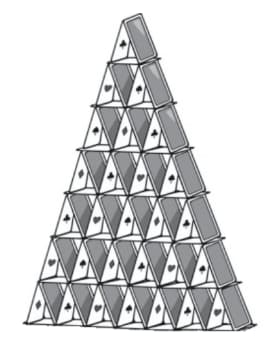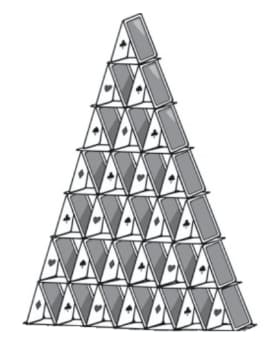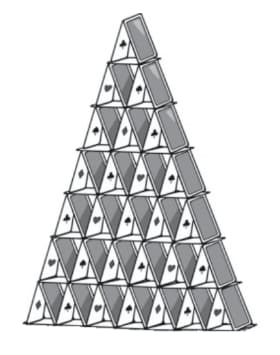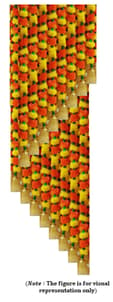NCERT Solutions for Chapter: Arithmetic Progressions, Exercise 1: Exercise
NCERT Mathematics Solutions for Exercise - NCERT Solutions for Chapter: Arithmetic Progressions, Exercise 1: Exercise
Attempt the practice questions on Chapter 5: Arithmetic Progressions, Exercise 1: Exercise with hints and solutions to strengthen your understanding. Mathematics Textbook of Competency Based Questions for Class X solutions are prepared by Experienced Embibe Experts.
Questions from NCERT Solutions for Chapter: Arithmetic Progressions, Exercise 1: Exercise with Hints & Solutions
Shown below is a house of cards, a structure created by stacking playing cards on top of each other in the shape of pyramid. Each small triangle is made of cards and each layer has less triangle than the layer below it.

Ankit and his friends were having a sleepover and wanted to do something fun. One of the friends suggested they could make a house of cards.
They have a total of cards with them.Find the maximum number of layers that Ankit and his friends can make using the cards they have, if they want to have triangle ( cards) at the top layer. Show your work.
Shown below is a house of cards, a structure created by stacking playing cards on top of each other in the shape of pyramid. Each small triangle is made of cards and each layer has less triangle than the layer below it.

Ankit and his friends were having a sleepover and wanted to do something fun. One of the friends suggested they could make a house of cards.
Ankit is planning to make a pyramid with the top and bottom layer containing and cards respectively.
How many layers will such a pyramid have? Show your work.
Shown below is a house of cards, a structure created by stacking playing cards on top of each other in the shape of pyramid. Each small triangle is made of cards and each layer has less triangle than the layer below it.

Ankit and his friends were having a sleepover and wanted to do something fun. One of the friends suggested they could make a house of cards.
Ankit and his friends want to use cards in the top layer and in the bottom layer.
Form an AP showing the number of cards in each layer starting from the top layer.
The average of an Arithmetic progression with terms is zero. One of its terms is zero.
Which term of the Arithmetic Progression is zero? Show your steps.
Huner said, "The value of the th term of ANY arithmetic progression is double that of the th term."
Is Huner's statement correct? Justify your answer.
Shivam bought a large quantity of marigold flowers to decorate his house for a family function. He used flowers to recreate the pattern shown below. He used flowers in the shortest garland and flowers in the longest garland.

If he kept the difference between two consecutive garlands the same, how many garlands did he make? Show your steps.
Parth was receiving spam calls from a telemarketing centre. He got the first call at as shown below.

If the telemarketer continues to call using the same pattern, at what time will Parth receive the th call? Show your work.
Let be consecutive terms of an arithmetic progression with common difference and let be consecutive terms of another arithmetic progression with common difference , where . For each , let be a rectangle with length , width and area . If , then the value of _____.
